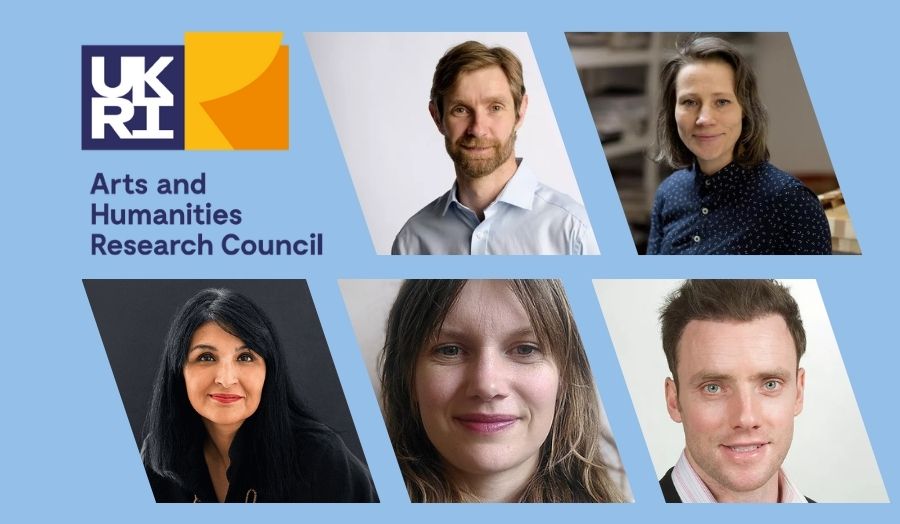Two new projects will explore sustainable urban living through rewilding and regenerative textiles.
Date: 4 July 2025
Two research teams at London Metropolitan University have secured major funding from the Arts and Humanities Research Council, winning two of just five available Design Exchange Partnership (DEP) grants. The projects, Wild Ways and Neighbourhood Textile Commons, form part of the broader Archway Cultural Commons research programme.
The grants will support London Met researchers to work with alumni and non-academic partners for one year from early 2025. Both projects explore 'more-than-human design', an approach that takes into account the needs of other species and the environment as well as people.
Wild Ways focuses on encouraging rewilding in private residential gardens in London to support urban biodiversity. Based at the Centre for Urban and Built Ecologies (CUBE), the study is co-led by Associate Professor of Sustainable Architecture Siân Moxon and Associate Professor of Public Health Dr Justin Webb. It builds on the Rewild My Street campaign and brings together design and behavioural science to test a strategy that helps residents make simple changes to create wildlife-friendly spaces. The work is supported by a partnership with the Kusuma Trust.
Neighbourhood Textile Commons, based at the Centre for Applied Research for Empowering Society (CARES), is led by Dr Torange Khonsari and Alice Holloway, and co-led by Dr Stephen Hills. It explores how communities can produce textiles sustainably while restoring local habitats and changing behaviour around land use. The team is working with the London Borough of Islington and the Maya Centre to develop a regenerative textile commons in Archway. Key initiatives include angora rabbit grazing to improve soil health, reed beds to filter natural dyes, sustainable craft methods, and exploring how green jobs can emerge from new supply chains linked to public spaces.
The DEP programme is part of the Design Museum’s Future Observatory initiative and supports research that benefits local communities and helps the UK respond to environmental challenges. These projects also connect with London Met’s London Met Lab: Environment initiative, which brings together academics and local partners to create practical solutions to city-wide issues.
Both projects address this year’s DEP theme of more-than-human design by focusing on the shared needs of people, nature and places. Wild Ways will test its approach through Rewild My Street, helping residents turn their homes, gardens and streets into wildlife habitats. Neighbourhood Textile Commons brings together fashion, textile and urban design to imagine new ways of using land in cities and to track citizen behaviour change. Both initiatives reflect the values set out in the university’s Art, Architecture and Design Education Declares statement, which commits to responding to the climate and ecological emergency through education and design.
How this helps people and society
These projects aim to deliver direct benefits to communities. Wild Ways gives residents the tools and knowledge to support biodiversity from their own gardens. Greener spaces can improve mental health, reduce local temperatures and support pollinators, birds and other wildlife. Neighbourhood Textile Commons focuses on building local circular economies that reduce waste, improve wellbeing through shared creative work, and open up opportunities for meaningful green employment.
Reflecting on the award, Siân Moxon said:
“We’re looking forward to building on our findings and widening the scope of Wild Ways with this valued support. We hope the outcomes will inspire rewilding in London and similar design-led work in other cities. It’s also exciting to explore the crossovers between our two London Met projects.”
In a statement linked to the wider Creative Archway initiative, the London Borough of Islington said:
“Our institutional relationship is built on a shared ambition for equality and justice. We are fortunate to have London Met as a passionate and professional borough advocate. Through the AHRC DEP, we continue our broader collaboration.”
Sophie Cloutterbuck, Director of London Engagement and London Met Lab, added:
“These grants show the power and purpose of London Met’s research. They are rooted in collaboration, focused on major challenges facing the city, and they create real opportunities for students. This is a clear example of our civic mission in action.”

Top row (L to R) Dr Justin Webb and Sian Moxon
Bottom row (L to R) Dr Torange Khonsari, Alice Holloway and Dr Stephen Hills
